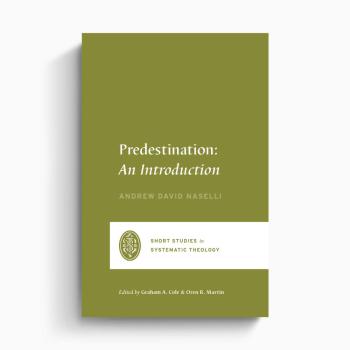Review of What Are You Afraid Of? Facing Down Your Fears with Faith by Dr. David Jeremiah
I confess, I know next to nothing about Dr. David Jeremiah. I’ve heard the name, sure, and am vaguely aware of a radio program and possibly a televised sermon. But, well, televangelism and religious radio programming being what they are, I was more than a little skeptical when I first cracked open his latest work, What Are You Afraid Of? Imagine my delight when I discovered that Dr. Jeremiah’s analysis of fear is both biblically sound and practically helpful. In fact, I was originally asked to read and respond to a single chapter, but I was so pleasantly surprised (and impressed) by the substance of the book that I went ahead and read the whole thing.
In this work, Dr. Jeremiah addresses eight of the most common fears faced in America today: natural disasters, physical illness, financial hardship or reversal, failure, rejection, physical danger, and death. (There is also a chapter on dealing with depression, though it’s slightly out of place here, as he’s not really addressing the fear of depression, but depression itself.) He closes the book with a chapter on the fear of the Lord and a short epilogue presenting the Gospel to his readers. 
In each chapter, Dr. Jeremiah refers us to a biblical example of the relevant fear (as well as a modern ‘hook’ to drive home its applicability today). He then moves on to a highly alliterative list of principles or approaches that will be helpful in overcoming that particular fear. The alliteration thing, which Dr. Jeremiah does better than most, does get a bit strained and tedious at times. Particularly since, with 10 chapters, and usually at least two separate alliterative lists for each fear, the sheer number of points severely reduces the mnemonic value of alliteration.
Unnecessary alliteration aside, the man makes some very good points. His discussions are driven predominantly by Scripture, though he draws from a variety of other sources, including (but not limited to): C.H. Spurgeon, J.I. Packer, John Stott, Ed Welch, A.W. Tozer, Matthew Henry, Tim Keller, John Piper, Dr. Marten Lloyd-Jones, and even the lesser known (or less frequently cited) Sinclair Ferguson, Ligon Duncan, and, one of my personal favorites, Puritan writer Thomas Watson. I realize you can’t tell everything about a writer/pastor from the sources he cites, but you can tell a lot. And that’s not a bad list of references.
For almost every fear, his proposed solution includes an admonishment to read and meditate upon the Bible, reminding yourself of the promises and character of the God you serve. I have found nothing so helpful in combating my own fears than steadfastly preaching God’s truth to myself. He also encourages his readers to continue in faithful obedience despite their fears, and to remember the ultimate future hope they’ve been given. This is resoundingly solid advice.
Dr. Jeremiah’s approach makes a lot of sense. After all, sin is always the result of unbelief, and sinful fear is no exception. If I am trapped in sinful fear, then there is some truth about God that I am not believing, or some lie about Him that I am believing. Whether I am doubting that God is good or questioning His sovereignty, at the end of the day my root issue is unbelief. It follows that the solution to my problem is increased faith in the true things of God contained in His Word. If I truly believe the Bible, in its entirety—I mean really, truly, deep-down-to-my-toes believe it—then I won’t give in to temptation, and I certainly won’t be afraid of silly things like death or disease. Dr. Jeremiah says as much in his introduction:
[…] God is the answer to all our fears. If God is good and loving (and He is), and if God is all-powerful (and He is), and if God has a purpose and a plan that includes His children (and He does), and if we are His children (as I hope you are), then there is no reason to fear anything, for God is in control of everything. […] The only way to walk boldly and confidently into an unknown future is to stake everything on the power and goodness and faithfulness of God. […] Biblical heroes were regular people who had to learn the same things you and I have to learn—to drive out fear by increasing their knowledge of God, to shift their focus from their present fear to the eternal God, to replace what they didn’t know about the future with what they did know about Him. (xii-xiii)
I couldn’t agree more. I could, perhaps, wish that Dr. Jeremiah included a more explicit discussion of the Gospel and its centrality to this prescription of preaching the Word to oneself in order to combat fear. Instead, the Gospel is relegated to the epilogue (though glints and glimmers of it appear along the way). It is in the Gospel that we see the clearest and best picture of the character of God—His love, His holiness, His justice, His sovereignty over the sin and destruction that plague our world. The Gospel reminds us that God, in Christ, has already addressed our deepest need and our greatest danger by bearing on the cross the penalty for our sin. As a result, we can be comforted in the face of lesser, temporal, hardships.
Still, the Gospel is there (if in the background), and the advice given is, as I’ve said, biblically sound. Dr. Jeremiah is, I think, more adept at addressing concrete, external fears than the more amorphous, internal ones like failure and isolation. His discussion of natural disasters is biblical and uncompromising without being unnecessarily inflammatory (a feat in-and-of itself). He is unwilling to diminish the sovereignty of God:
Whether it’s comfortable or not, we must discuss this issue with theological integrity. The Bible teaches us that God is sovereign—He reigns in the nice moments and in those that aren’t so nice. (6)
Amen.
Likewise, the chapters on disease (informed by his own ongoing battle with cancer), financial hardships, and danger or calamity are compassionate but unwavering in their view of God’s sovereignty, as Dr. Jeremiah gently-but-frankly reminds us that storms will come, and that God works in and through them for our good and His glory.
The more emotional chapters were less impressive, but still far from bad. The chapter of fear of failure was a bit too ‘rah rah rah, God will make you successful!’ for my taste, and the chapter on depression (again, not explicitly a “fear”) felt out of place in this work. And the biblical model for the fear of rejection (Peter’s denial of Christ) wasn’t the best fit for the topic. Not that I think Peter relished the idea of being socially rejected for his association with Christ, but I suspect the slightly more pragmatic fear of imminent arrest and execution may also have been in play. Still, the advice proffered, though less gospel-centric than I would like, was both sound and helpful: prioritize the approval of God (which is already assured in Christ), love God more, genuinely love those whose approval you so desperately desire, believe God’s Word and promises, and seek His glory instead of your own. I have no quibble with any of that.
In closing, Dr. Jeremiah reminds us of the single fear we should actively cultivate: the fear of the Lord. For Dr. Jeremiah—and throughout Scripture—this fear is not merely awe, though it is certainly that. Instead, he describes the fear of the Lord as the appropriate terror experienced by sinful people when confronted by a perfectly holy, righteous God. This is no mere ‘sunset’ for us to ooh and ahh over; our God is a consuming fire, and apart from Christ, His holy wrath will incinerate us. However, in Christ, we are reconciled to Him, and while we still fear his power and perfection, that fear is tempered by awe that this mighty God suffered in our place that we might be forgiven. We are flabbergasted by His love, and we can’t help but love Him in return—even though the fear of His holiness never fully dissipates (nor should it).
All in all, this is a well-written and biblically sound treatment of common fears. Dr. Jeremiah’s recommended approach—read the Word, believe the Word, and obey the Word, while remembering that your future is secure—is firmly rooted in Scripture, and will, I think, be useful and encouraging to his readers as we all fight against our sinful fears with ever-increasing faith.
_______________________________________________________________
This book was reviewed in connection with the Patheos Book Club.
Alexis Neal regularly reviews young adult literature at www.childrensbooksandreviews.com and everything else at quantum-meruit.blogspot.com.












